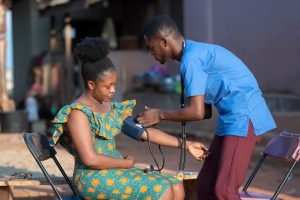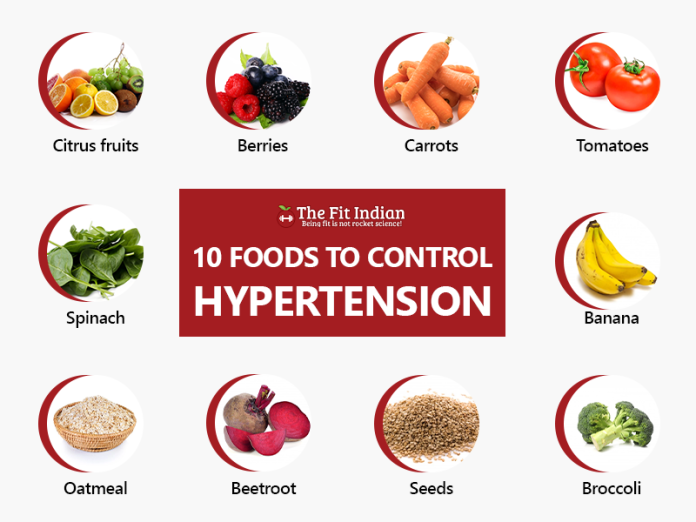Experts have said there is no proven cure for hypertension, advising that prevention is better than cure.
This is as physicians warn that the cost of treatment with anti-hypertensive drugs has gone up.
They emphasize prevention because hypertension can be prevented through healthy diet with frequent consumption of green leafy vegetables, avoidance of excessive table salt and red meat intake and maintaining a healthy weight and body mass index.
Why hypertension remains prevalent

Hypertension is a major cause of premature death worldwide, including in Nigeria. Unfortunately, not many people know they have the condition because they are not diagnosed and therefore remain untreated.
According to the Executive Director of National Health Foundation, Dr. Kingsley Akinroye, the prevalence of hypertension is estimated to be between 30 and 40 per cent of Nigeria’s over 200 million population, which is in the range of 60 to 80 million Nigerians.
Akinroye, who is also a consultant cardiologist, said almost one in three adults suffers from hypertension, while only one third of this figure (about 26.7 million Nigerians) are on treatment.
Women more aware of hypertension than men
Akinroye said a survey by the NHF showed that the awareness of hypertension is more in the urban than rural areas; while more women are aware of the noncommunicable disease than men.

The physician noted that the ideal blood pressure is 120/80 mmHg, but in Nigeria, normal blood pressure is 140/90 mmHg. “Any figure higher than 140 mmHg for systolic blood pressure or 90 mmHg for diastolic blood pressure is regarded as hypertension,” Akinroye said.
Another hypertension expert and Dean, Faculty of Clinical Sciences and Director, Centre for Genomic and Precision Medicine at the College of Medicine, University of Ibadan, Prof. Mayowa Owolabi, said about 50 million Nigerians and nearly half of those above 25 years are hypertensive at Blood Pressure (BP) greater and equal to 140/90 mmHg.
Why hypertension cases are rising
Owolabi blamed the rise of the disease on unhealthy diet (red meat, high salt intake and low consumption of green leafy vegetables), sedentary lifestyle, obesity, smoking and air pollution.
Owolabi, who is also the Lead Co-Chair, WHO-World Stroke Organisation-Lancet Neurology Commission on Stroke, said increase in complications is due to the low proportion of individuals with hypertension who are diagnosed, treated and controlled.
The consultant neurologist said, in Africa, up to 93 per cent of those with hypertension are unaware, untreated or uncontrolled, adding that uncontrolled hypertension is the premier risk factor for stroke, heart attack, kidney failure and heart failure.
Owolabi said people’s inability to afford treatments for hypertension is one of the reasons for poor adherence to treatment.
He said health insurance coverage for hypertension treatment, subsidising medication cost, and provision of free generic medications through collaboration between government and pharmaceutical companies will improve access.
Mandatory screening for hypertension
On recommendations on how to reduce the burden of hypertension in Nigeria, Owolabi said screening for hypertension should be mandatory for citizens above the age of 18.
“This can be implemented at all health facilities, especially primary healthcare centres. Hypertension treatment and control should be enhanced through a protocol-based referral system that empowers primary healthcare centres to participate under supervision in the initiation of treatment for uncomplicated hypertension,” he said.
For health and wellbeing, WHO recommends at least 150 to 300 minutes of moderate aerobic activity per week (or the equivalent vigorous of activity) for all adults, and an average of 60 minutes of moderate aerobic physical activity per day for children and adolescents.
People with high blood pressure may not feel symptoms and the only way to know is to get their blood pressure checked.
10 things to know about hypertension
1. Hypertension also known as high blood pressure is when the pressure in your blood vessels is too high -140/90 mmHg or higher. Blood pressure numbers of less than 120/80 mm Hg are considered within the normal range.
2. Studies say about 40 per cent of Nigeria’s population live with hypertension. Over 80 million Nigerians are living with hypertension in the country. The prevalence is higher in the urban areas.
3. The things that can increase the risk of having high blood pressure are old age (age over 65 years), a family history of hypertension, and being overweight or obese (If your Body Mass Index is 25.0 to <30, it falls within the overweight range. If your BMI is 30.0 or higher, it falls within the obesity range), not being physically active, high salt diet, drinking too much alcohol, tobacco, and diet high in saturated fat and trans fats.
4. Poverty, anxiety, preeclampsia, and eclampsia also fuel hypertension.
5. People with very high blood pressure (usually 180/120 or higher) can experience symptoms like severe headaches, chest pain, dizziness, difficulty breathing, nausea, vomiting, blurred vision or other vision changes, anxiety, confusion, buzzing in the ears, nosebleeds, and abnormal heart rhythm. If you are experiencing any of these symptoms, seek care immediately.
6. The only way to detect hypertension is to have a health professional measure blood pressure. Having blood pressure measured is quick and painless. You can also measure your blood pressure using automated devices, but an evaluation by a health professional is important for the assessment of risk and associated conditions.
7. Hypertension can cause other health challenges like heart, brain, and kidney diseases, and is one of the top causes of death and diseases throughout the world. It can be easily detected by measuring blood pressure, at home or in a health centre, and can often be treated effectively with low-cost medications.
8. If you have heart disease or stroke, diabetes (high blood sugar), chronic kidney disease, or high risk for cardiovascular disease, your blood pressure goal is less than 130/80.
9. To prevent and lower high blood pressure, eat more vegetables and fruits, sit less, be more physically active (Walk, run, swim, dance, lift weights), and get involved in at least 150 minutes per week of moderate-intensity aerobic activity or 75 minutes per week of vigorous aerobic activity, lose weight if you’re overweight or obese, take medicines as prescribed by your health care professional, and keep appointments with your health care professional.
10. You can reduce the risks of hypertension by reducing and managing stress, regularly checking blood pressure, treating high blood pressure, and managing other medical conditions.


